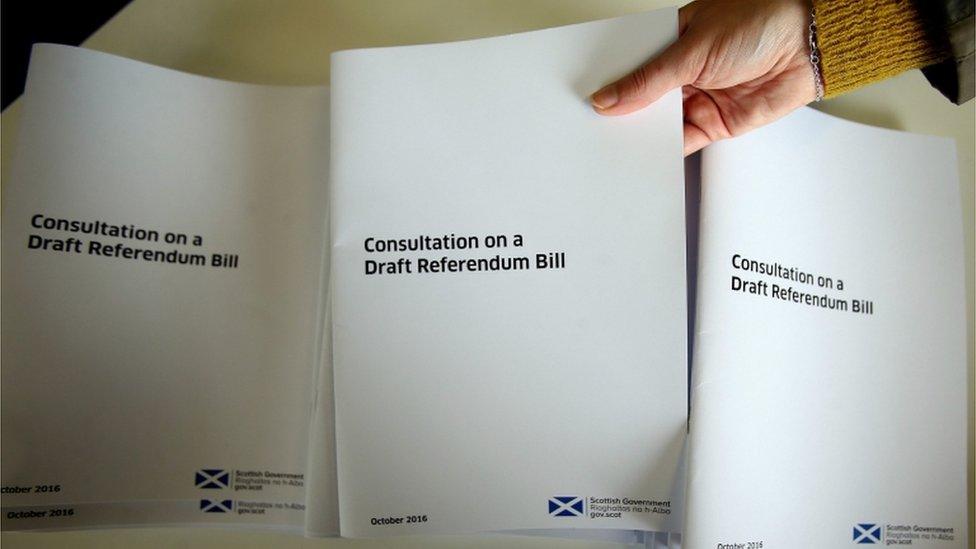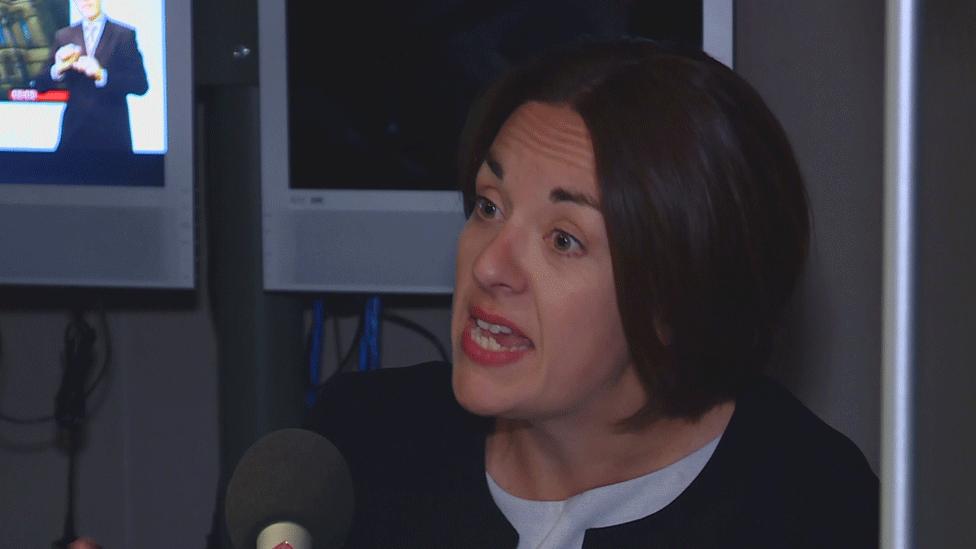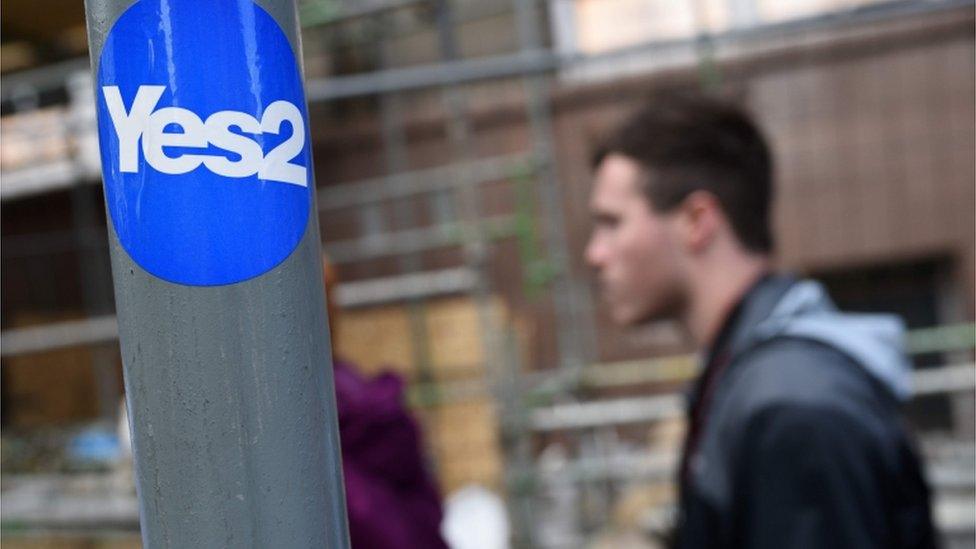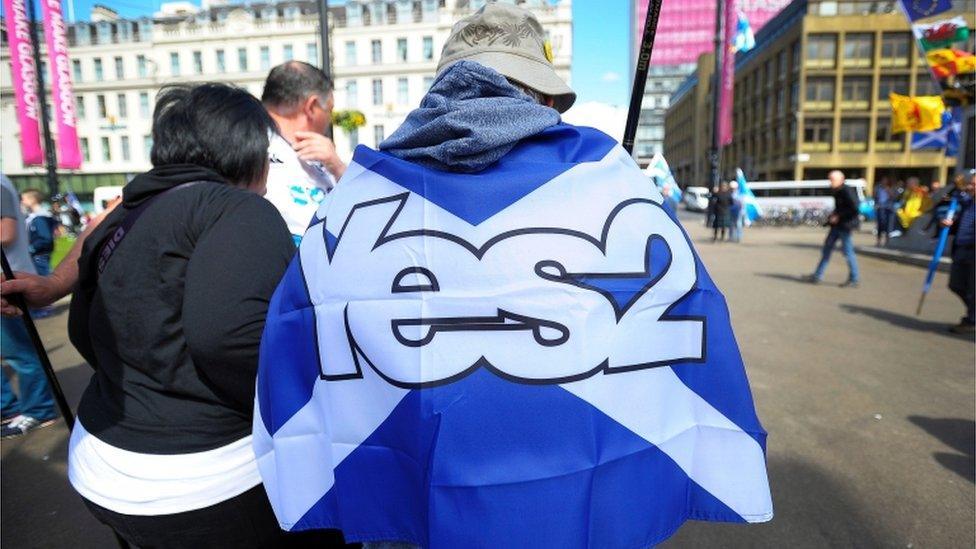Sturgeon suggests soft Brexit could take indyref off table in short term
- Published
- comments
Nicola Sturgeon says she is "willing to put aside my preferred option of independence in the EU" in favour of a soft Brexit
Nicola Sturgeon has suggested a soft Brexit would see the prospect of Scottish independence removed - in the short term.
Speaking on the BBC's Good Morning Scotland programme, the first minister said she believed Scotland's "direction of travel" was towards independence.
But she said this could be "put aside" in the short term as she seeks "consensus and compromise" over Brexit.
Opposition parties want Ms Sturgeon to rule out a second referendum.
Ms Sturgeon said she wanted the UK to retain membership of the European single market, the so-called soft Brexit option.
If the UK as a whole was to leave the market, she has set out terms on which Scotland could potentially stay in, but these would require new powers being devolved to Holyrood.
Voters in Scotland backed the UK staying in the EU by 62% to 38%.
Ms Sturgeon said she favoured Scotland remaining in the European Union as an independent country, and her government is currently consulting on a draft bill for a second independence referendum.
However, she acknowledged that "in terms of the timetable of Brexit" the prospect of Scottish independence could be taken off the table if a soft exit could be achieved.
'Additional powers'
She said: "We want to try to work with others across the UK, across the political spectrum, to try to keep the UK in the single market."
Ms Sturgeon said if that could not be done then her government had put forward a plan, external to UK ministers detailing how Scotland could retain membership of the single market, that includes devolving powers over areas including immigration and employment law to Holyrood.
She added: "I think there's a lot of consensus starting to build around some of those additional powers, for example around immigration.
"We've put forward very detailed plans about how we avoid a hard Brexit and the reason it's important to avoid a hard Brexit, let's not forget, is because that will have a devastating impact on our economy and on jobs.
"So I'm in a sense willing to put aside my preferred option of independence in the EU to see if we can explore a consensus and compromise option."

The Scottish government's consultation on the Draft Referendum Bill closes on 11 January
When pressed on the question of a second independence referendum being taken "off the table" in the event of a soft Brexit, Ms Sturgeon added: "In terms of the timescale of Brexit, that's what I've been very clear about.
"Am I going to stop arguing for independence or believing in independence? Am I going to stop believing that Scotland is on a journey to independence?
"No, but we're talking here about the particular context and timescale of Brexit - and I'm putting these proposals forward in good faith. I'm deliberately saying, 'put my preferred option to one side' and asking people if we can find a consensus and compromise option."

Analysis by BBC Scotland political reporter Philip Sim
Nicola Sturgeon suggests that a "soft" Brexit could see the prospect of Scottish independence recede, at least in the short term.
But is such a soft Brexit likely? Based on the current rhetoric out of Westminster, it's hard to say so with any confidence.
At the moment, Brexit provides the most likely trigger for a second independence referendum. Effectively Ms Sturgeon is accepting that if the conditions set out in the Brexit plan she published in December are met, then it would make pulling that trigger more difficult to justify.
But again - how likely is this?
If you need a hint about what Ms Sturgeon thinks, immediately after her appearance on Radio Scotland, the first minister retweeted a newspaper front page stating that the "UK faces a very hard Brexit".
She later added that it was a "reasonable assessment" to suggest that indyref2 is currently more likely than a soft Brexit.
This is another measure to pile pressure on Theresa May's government over the "compromise" deal set out by the Scottish government. Indications of how likely it is to be accepted should emerge as the prime minister's Brexit plans become clearer.

John Curtice, a professor of politics at Strathclyde University, told the BBC's World at One programme that Ms Sturgeon had changed her tone, if not her position on Brexit.
He said: "She has indicated since 23 June that should her vision of Brexit be realised, at least for Scotland, then she wouldn't necessarily hold the [independence] referendum.
"Today has seen the tone of being willing to say 'the referendum may not happen' is perhaps a bit more explicit. But what she wasn't asked is what would happen if she were not to get the version of Brexit she is looking for - given how soft the version of Brexit she's looking for is, there must be a pretty high probability that she won't get what she wants."
Mr Curtice added that with current polling "not a million miles away" from the result of the 2014 independence vote, "holding a second independence referendum any time soon would represent a very significant gamble as far as Nicola Sturgeon is concerned."
The Conservatives, Labour and the Lib Dems have all spoken out against a second independence vote, while the Greens are in favour of one.
'Blind faith'
On Thursday, Scottish Labour leader Kezia Dugdale told Good Morning Scotland that the UK is more important to Scotland than the EU, saying Ms Sturgeon had failed to produce "real evidence" of how Scotland could stay in the single market if the UK as a whole leaves.
She said she had worked with the first minister in good faith about protecting Scotland's place in Europe, but said "good faith is fast becoming blind faith".
Ruth Davidson tells the World at One the First Minister is "keeping Scotland in limbo" over second referendum
Scottish Conservative leader Ruth Davidson said Ms Sturgeon had spent "six months trying desperately to use Brexit as a way of increasing support for independence", adding that "she's failed".
She said: "Scotland is kept in limbo as Nicola Sturgeon tries to find an escape route after marching her troops to the top of a mountain, but still keeping the threat of a second referendum on the table as a possibility for the future.
"The first minister should act in the interests of the whole country by recognising the decision Scotland made just two years ago and respecting that result.
Scottish Lib Dem leader Willie Rennie said Ms Sturgeon was "in danger of inflicting considerable and damaging economic uncertainty on Scotland".
He said: "Nicola Sturgeon should now rule out another independence referendum to end this damaging uncertainty.
"You would think that with all the problems with a slipping educational performance, a shortage of GPs and struggling mental health services that the SNP would get on with finding solutions. But the SNP are obsessed with independence so those issues will never be their top priority."
And Ross Greer of the Scottish Green Party has said rights for Scots could only be secured if Scotland was an "independent nation with the European Union".
- Published5 January 2017

- Published4 January 2017

- Published20 October 2016
